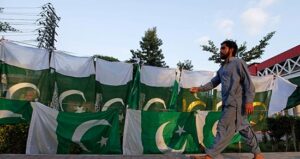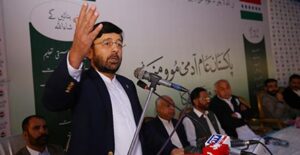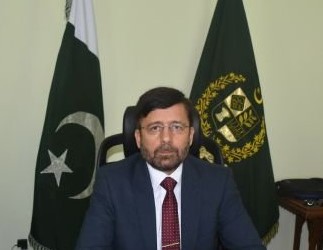I retired from the military in November 2016 after 37 years of service. To employ my vast security-related experience, I along with Mr. Abdullah Khan, established a think tank — Pakistan Institute for Conflict and Security Studies (PICSS), Islamabad — that focuses on monitoring, recording, evaluating, and reporting on the anti-state violence mainly in Pakistan and Afghanistan, while keeping an eye on broader Asia.
During our interactions with the academic community and influential officials as well as the youth, I could draw a conclusion that hardly anyone was satisfied with the system of governance and those running it. During the PICSS seminars in various universities across the country, I noticed a strong sense of apathy and despondency prevailing, especially among young Pakistanis. The youngsters appeared mostly disillusioned and hopeless about their future and their country because of rampant corruption, nepotism, and elitism in almost every civilian-run institution and that too, at every level.
I discussed these issues with close friends and even many acquaintances. Most of them appeared deeply concerned about the state of affairs and discussed them endlessly, but what Pakistan needed were not mere empty words but solid actions too. Yes, Pakistan’s maladies needed a pragmatic and practical approach to take on the mafias destroying Pakistan in every sector. That meant taking the bull by the horns — not an easy undertaking by any means.

Another major decision that I took after retirement was to get back to my roots — an option seldom exercised by retired officials, who mostly prefer to settle in big cities.
To reconnect with my people after a gap of 37 years, I decided to register the Khushal Khattak Trust (KKT). The KKT focuses on providing and promoting healthcare and education among the needy as well as creating awareness about the negative fallout of drug abuse and aerial firing. Conflict resolution is also an important activity which is being carried out through the KKT platform.
The KKT remains my humble effort to pay back to my people. This platform — run through our meagre resources — has been serving the people for the last four years.
During the routine management of KKT affairs, I experienced that in order to get full support of the politically appointed district administration, police, and other related departments, one has to be either on the right side of the ruling political elite or else one would be seen and taken as a potential rival.
I experienced a lot of bitterness and unnecessary obstacles at the hands of the local political elite that reinforced my belief that the problem lies with the system. We, therefore, decided to initiate a struggle at the grassroots level to create awareness about political empowerment to motivate and groom capable, patriotic, and well-meaning people from the middle class, who are kept outside the ambit of the country’s power equation by the corrupt ruling elite.
Towards the end of 2019, when I was tipped as Pakistan’s High Commissioner to Sri Lanka, a few of our friends decided to commence the formal and arduous struggle to break these shackles and free the common man from the clutches of the elite.

We started the process of discussion on registering a political party representing the proverbial Aam Admi (common man) and ensuring that he reaches the corridors of power. After due diligence and deliberations, my friends in Pakistan began the process of registering a political party with the Election Commission of Pakistan.
Why Pakistan Aam Admi Movement?
More than 98 percent of Pakistanis are left out of the power equation as the system is tailored to benefit and serve the interests of the 2 percent that make up the political and bureaucratic elite. The common man needs to be shaken from his deep slumber and motivated and mobilised to challenge the ruling elite and change the status-quo. I had to cut down my tenure as the High Commissioner by three months, to play my role in the formation of the party for the common man.
On numerous occasions, both during my formal and informal interactions with the elite and common people, we were confronted with many sarcastic questions. The main ones were; why another political party? Don’t we have enough of them — more than 150 registered parties, to be precise? What did these parties achieve for the common man? How will our party be different from them? How will we break the hold of the dynastic political elite which is hand-in-glove with the bureaucracy and the other power centres? Who would provide funds for the new party? Whose agenda are we pursuing? Are we working on someone’s behest?
These and many more pointed questions are still being asked from us on a daily basis.
Like almost all common Pakistanis, it is our considered opinion that all the major political parties, including the ruling party, have miserably failed to address the problems of the people and meet their aspirations.
While the business empires of the elite within these parties have expanded, they have displayed complete indifference to the interests of the country and its 220-million inhabitants. The bureaucratic apparatus supports the status-quo forces, protecting its own narrow interests at the cost of wider national interests.
Pakistan Aam Admi Movement (PAAM) was registered on October 29, 2021 after which it formally and modestly commenced its political journey across the country. We are receiving a tremendous response especially from the youth across the country.

The party is trying to provide a platform for those able, qualified, patriotic citizens, who have the capabilities and capacity to take the country forward by participating in the political process.
This silent majority, despite being fully aware of Pakistan’s ills, is unable to contribute because of the entrenched political mafia. The PAAM has taken the plunge against the tide and with the will of Allah would make its contribution.
The party was successfully launched at the Karachi Press Club on January 16, 2022, the occasion was attended by common people, including many women, representing a cross section of Pakistan.
Karachi was intentionally chosen for the launch of PAAM since it serves as the melting pot of ‘Aam Admi’ belonging to every ethnicity, sect, religion, and province. It is the former capital, the city of Pakistan’s founding father, a business and industrial hub and the economic engine of the country. Yet, Karachi remains deprived of its share in virtually everything thinkable. By launching our party in Karachi, we wanted to demonstrate our solidarity and commitment with the city and its people and pledge to undo all the wrongs and injustices done to our ‘mini-Pakistan.’ Bridging all the divides, we will restore Karachi to its rightful position with the public support, InshaAllah.
PAAM’s aims and objectives in brief:
- Bring forward leadership from the middle-class through a bottom-up approach. Build institutional, focused leadership rather than a personality-centric entity and change the decision-making process to shared collective wisdom rather than revolving around an individual and his or her cronies.
- Focus on exposing and eradicating corruption as a top priority. It is a challenging task, but not an impossible one. For this, PAAM aims to introduce sweeping reforms in our judicial system to make it quick, cheap, and easily accessible for the common man. We want a judicial system which can give exemplary punishments to the criminals and the corrupt and protect the innocent.
- The judicial reforms — made on a war footing — will also make the system responsive to the day-to-day public needs and societal aspirations. The lost public trust in the existing judicial system as an institution will have to be restored through active participation and cooperation of the executive and judiciary. Major surgery and aggressive reforms will be an inescapable necessity.
- The healthcare and education system — that are by-and-large non-responsive to the needs of the common majority — will have to be revamped. A uniform education system will be introduced that would not just give degrees and worldly knowledge, but groom students in line with the true spirit of our Islamic values.
- Improve governance and public delivery through rapid incorporation of digital e-governance to make the entire system transparent, efficient, and responsive to the public needs with minimal interference from the elite and their bureaucratic and societal extensions.
- Focus on our youth — both boys and girls — and increase their stakes in political governance as per their aspirations so that Pakistan can utilize their potential, talent and energies. The new education and political system will make the youth a permanent stakeholder, giving them a feeling of pride in their contributions and ownership in the noble task of nation-building and achieving the goal of a prosperous Pakistan.
- Use of technology to make doing business easy and transparent as well as in all the facets of governance and public delivery systems.
- The economy needs to be fixed through a major surgery through home-grown solutions. A ‘Made in Pakistan’ approach will be adopted as a top priority. The sacrifices and surrendering of perks and privileges will begin from the top. Major reviews of imports and exports will be done, while both the earnings and spending will be linked to NADRA database with the CNIC as the primary document thus revamping the entire taxation system.
- The IMF programmes will have to be phased out with better fiscal and economic planning, focusing on greater self-reliance and national pride. The nation’s financial and economic sovereignty and self-reliance will be our sacrosanct priority. The entire banking system will be made riba-free, ending the perpetual war with the Almighty Allah.

Conclusion:
The continued silence and apathetic patience of the majority towards the state of affairs in Pakistan is criminal and no longer sustainable. It is dangerous and detrimental to the future of our country and future generations. The moment of now or never has arrived. The country and its people had pinned their hopes on the current political dispensation. It proved no different from the past and jumped in bed with the status quo forces. Now it stands hijacked. Efforts to put it back on track are futile as the political leadership has lost its credibility. The country and its people can no longer take the shame that has been inflicted upon them by these self-centred elites. The time has come for the majority — the true custodians of Pakistan — to take charge of their destinies. No other political party provides the hope, honesty, transparency in its affairs, a shared decision-making mechanism, inclusivity and opportunity that the PAAM does for the ordinary people. They must come forward and be counted.
The PAAM has appeared on the political horizon at a critical juncture of our history. The time has come to change the nation’s destiny, rid it from the poison of dynastic politics, and lead it on the path where Pakistan can fulfil the dreams of Allama Iqbal and Quaid-e-Azam. The dreams of a strong, stable, modern, and prosperous Pakistan — in line with the true spirit of the Islamic welfare state.
May Allah Guide us towards that destination. Ameen.

The writer is a retired Major General of the Pakistan Army and a former Pakistan High Commissioner to Sri Lanka. He has launched his own political party, the Pakistan Aam Admi Movement.

